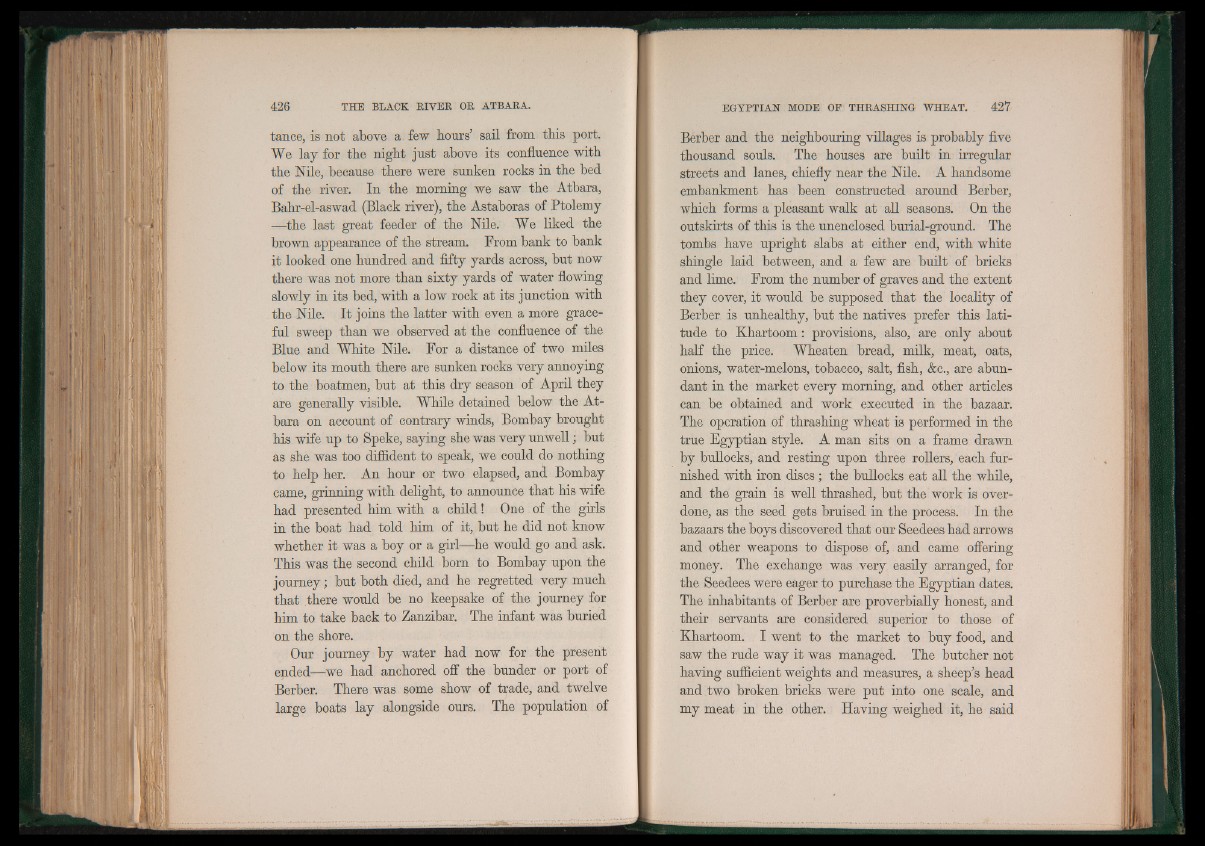
tance, is not above a few tours’ sail from tbis port.
We lay for the night just above its confluence with
the Nile, because there were sunken rocks in the bed
of the river. In the morning we saw the Atbara,
Bahr-el-aswad (Black river), the Astaboras of Ptolemy
—the last great feeder of the Nile. We liked the
brown appearance of the stream. From bank to bank
it looked one hundred and fifty yards across, but now
there was not more than sixty yards of water flowing
slowly in its bed, with a low rock at its junction with
the Nile. I t joins the latter with even a more graceful
sweep than we observed at the confluence of the
Blue and White Nile. For a distance of two miles
below its mouth there are sunken rocks very annoying
to the boatmen, but at this dry season of April they
are generally visible. While detained below the Atbara
on account of contrary winds, Bombay brought
his wife up to Speke, saying she was very unwell; but
as she was too diffident to speak, we could do nothing
to help her. An hour or two elapsed, and Bombay
came, g rin n in g with delight, to announce that his wife
had presented him with a child! One of the girls
in the boat had told him of it, but he did not know
whether it was a boy or a girl—he would go and ask.
This was the second child born to Bombay upon the
journey; but both died, and he regretted very much
that there would be no keepsake of the journey for
him to take back to Zanzibar. The infant was buried
on the shore.
Our journey by water had now for the present
ended—we had anchored off the bunder or port of
Berber. There was some show of trade, and twelve
large boats lay alongside ours. The population of
Berber and the neighbouring villages is probably five
thousand souls. The houses are built in irregular
streets and lanes, chiefly near the Nile. A handsome
embankment has been constructed around Berber,
which forms a pleasant walk at all seasons. On the
outskirts of this is the unenclosed burial-ground. The
tombs have upright slabs at either end, with white
shingle laid between, and a few are built of bricks
and lime. From the number of graves and the extent
they cover, it would be supposed that the locality of
Berber is unhealthy, but the natives prefer this latitude
to Khartoom: provisions, also, are only about
half the price. Wheaten bread, milk, meat, oats,
onions, water-melons, tobacco, salt, fish, &c., are abundant
in the market every morning, and other articles
can be obtained and work executed in the bazaar.
The operation of thrashing wheat is performed in the
true Egyptian style. A man sits on a frame drawn
by bullocks, and resting upon three rollers, each furnished
with iron discs; the bullocks eat all the while,
and the grain is well thrashed, but the work is overdone,
as the seed gets bruised in the process. In the
bazaars the boys discovered that our Seedees had arrows
and other weapons to dispose of, and came offering
money. The exchange was very easily arranged, for
the Seedees were eager to purchase the Egyptian dates.
The inhabitants of Berber are proverbially honest, and
their servants are considered superior to those of
Khartoom. I went to the market to buy food, and
saw the rude way it was managed. The butcher not
having sufficient weights and measures, a sheep’s head
and two broken bricks were put into one scale, and
my meat in the other. Having weighed it, he said